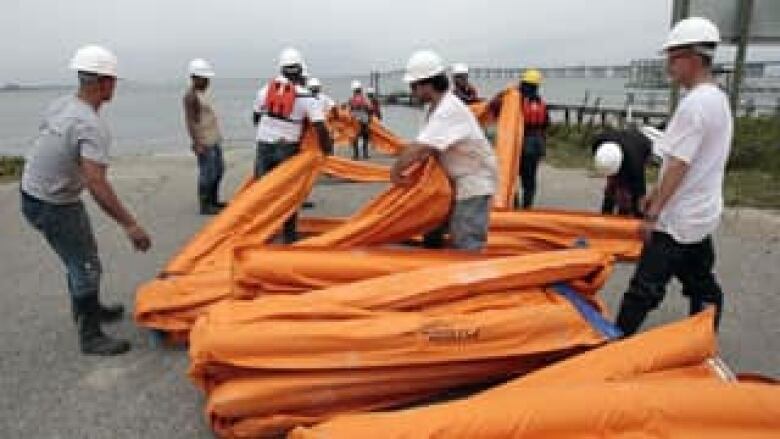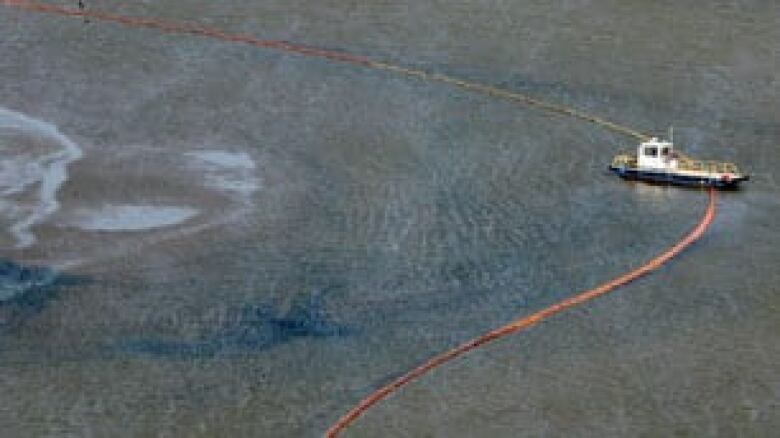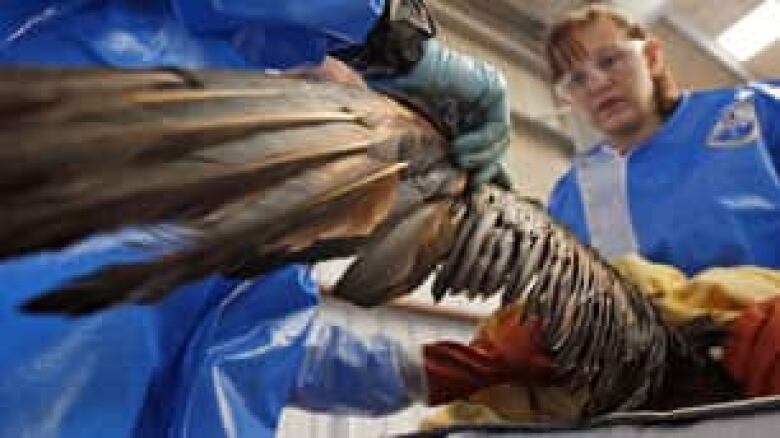BP downplayed oil-rig disaster risk
'No adverse impacts are expected,' platform operator said in 2009 filing
The petroleum giant operating theGulf of Mexicooil rig thatexploded last week, causing millions of litres ofoilto spew intothe sea, de-emphasized the risk of a catastrophe in paperwork it submitted last year to the U.S. government.
British energy company BP Plc. said it was "unlikely that an accidental surface or subsurface oil spill would occur" fromthe well itwas proposing todrill 80kilometres off the Louisiana shore.
And if such a spill did occur, the company said, "due to the distance to shore and the response capabilities that would be implemented, no significant adverse impacts are expected."

The assessments are part of BP's 52-page submission, dated February 2009,seeking approval from theU.S. Minerals Management Service to begin drilling the Deepwater Horizon well.
The federal agency gave the go-ahead, and the company began drilling in September 2009.
Last week, the Deepwater Horizon rig exploded and then collapsed into the Gulf of Mexico, rupturing the wellhead and sending forth 5,000 barrels a day of oil into the sea. Eleven people went missing in the disaster and are presumed dead.
At leastsix millionlitres ofpetroleum have spilled so far, according to U.S. Coast Guard estimates, making it one of the worst U.S. oil spills in decades. Tens of thousands of animals, including birds and marine life, living along the southeast U.S. coast are at risk.
"Clearly, the sort of occurrence that we've seen on the Deepwater Horizon is clearly unprecedented," BP spokesman David Nicholassaid Friday. "It's something that we have not experienced before a blowout at this depth."
But a Mississippienvironmental lawyer said Friday thatBP's 2009 government submission showsit failed to determine what kind of technology would be needed to control a possible spill at that depth.
"The point is, if you're going to be drilling in 5,000 feet of water for oil, you should have the ability to control what you're doing," said Robert Wiygul,also aboard member for the Gulf Restoration Network.
Cleanup efforts hampered
Meanwhile Friday, high waves and brewing storms hampered efforts to containthe massive and growing spill justas traces seeped into the coastal wetlands of Louisiana and surrounding states.
Waves about two metres high pushed tides a metre above normal toward the coast.The U.S. National Weather Service predicted winds, high tides and waves through Sunday. Thunderstorms were also expected in the areaFriday.
The weather has made it impossible for crews to skim oil from the water's surface or burn it off, said Rear Admiral Sally Brice-O'Hara, the deputy commandant of operations forthe U.S. coast guard.
Faint fingers of oil sheen began lapping at the state's shoreline on Thursday night while thicker oil hovered less than 10 kilometres offshore.

Remaining oil from the slick, which measures about 1,500 square kilometres, is expected to wash ashore in Mississippi on Saturday before reaching Alabama on Sunday and Florida on Monday, putting those areas at risk of environmental catastrophe.
Florida Gov. Charlie Crist declared a state of emergency Friday for six counties in the state's Panhandle.
Alabama Gov. BobRiley also declared a state of emergency Friday, calling the oil spill "a serious threat to ourenvironment and economy."
An animal rescue group at Fort Jackson, La.,about 113 kilometres southeast of New Orleans, said it was treating its first patient from the spill:a young northern gannet found offshore and covered in thick, black oil.
Could eclipse Exxon Valdez

The U.S. government has vowed to use every means at its disposal to prevent widespread environmental damage.
"There are now five staging areas to protect sensitive shorelines, approximately 1,900 federal response personnel and more than 300 response vessels and aircraft on the scene 24/7," President Barack Obama said Friday.
Louisiana Gov. Bobby Jindal has also declareda state of emergency,mobilizing the Louisiana National Guard.
Ata Friday afternoon briefing, U.S. Homeland Security Secretary JanetNapolitano encouraged BP to step upits efforts to contain the flow of oil.
"It is clear that after several unsuccessful attempts to secure the source of the leak, it is time for BP to supplement their current mobilization as the slick of oil moves towards shore," she said.
BP chief operating officer Doug Suttles pegged the costs of the cleanup at between $6 million and $7 million US a day, althoughthisisexpected to rise as the oil gets closer to the coastline.
Officials 'frightened'
The area off the Louisiana coast is teeming with shrimp, oysters and other marine life, helping to make the state's $1.8-billion annual seafood industry the largest in the lower 48 states. More than 1.8 million migratory waterfowl use the Louisiana coastal wetlands.
U.S. coast guard crewspatrolled the marshes Friday looking for areas where the oil had flowed in.

Prolonged contact with the skin can cause burns, said Nils Warnock, a spill recovery supervisor with the California Oiled Wildlife Care Network at the University of California.
The U.S. Fish and Wildlife Service was focusing on national wildlife refuges on a chain of offshore barrier islands.
About 34,000 birds have been counted in the national refuges most at risk, said Tom McKenzie, the service'sregional spokesman. Gulls, pelicans, roseate spoonbills, egrets, shore birds, terns and blue herons are in the path of the spill.
Mink and river otter also live in the Mississippi delta and might eat oiled carcasses.
BP responsible for cost, cleanup
On Friday, Obama announced a freeze on new offshore oil drilling leases until a review of the accident that caused the spill is complete and new safety measures are in place.
Obama had recently lifted a drilling moratorium for many offshore areas, including the Atlantic and Gulfareas.
London-based BP, which had contracted the drilling rig, is fully responsible for funding the cleanup.
The oil company has already deployed more than 54,000 metres of booms, which are deployed across the water's surface to contain parts of the oil slick, and has begun controlled burns of some portions of the slick.
It is also working to find ways of stemming the flow of oil into the water at the wellhead, including using underwater dispersants, drilling a relief welland developing a unique dome collection system.
"It's this massivesquare structure that you could liken to an umbrella that we would place down over the leak itself to collect it and pipe it up to a vessel on top of the water," BP spokesman Mike Abendhoff told CBC News.
Fellow oil giants Exxon, Shell and Conoco are helping with the cleanup, Abendhoff said.
"But we also have to recognize, too,[the oil is]over a very large area and it's a very light sheen, so the ability to be able to get every last drop is going to be difficult," he said.
BP's stock market value has declined by roughly $25 billion US since the explosion.
With files from The Associated Press












_(720p).jpg)


 OFFICIAL HD MUSIC VIDEO.jpg)
.jpg)



























































































